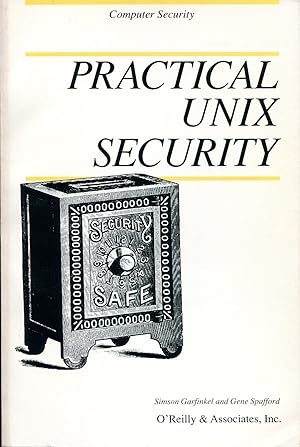If you are a UNIX system administrator or user who deals with security, you need this book. It's a practical guide that spells out your options for both Berkeley UNIX and System V. It's complete, rational, and doesn't require that you be a programmer to use it.Practical UNIX Security describes the issues, approaches, and methods for implementing security measures, spelling out what the varying approaches cost and require in the way of equipment. After presenting UNIX security basics and network security, this guide goes on to suggest how to keep intruders out, how to tell if they've gotten in, how to clean up after them, and even how to prosecute them. Filled with practical scripts, tricks, and warnings, Practical UNIX Security tells you what you need to know to make your UNIX system as secure as it possibly can be.Contents include:
- Understanding basic UNIX functions, such as users, passwords, groups, superuser, and the file system.
- Defending against security breaches.
- Defending against network and communication breaches, using modems, UUCP, NFS, secure NFS, Kerberos, and firewall machines.
- Handling break-ins or other security incidents and repairing the damage.
- Applying techniques of encryption and physical security to UNIX.
- Appendices: UNIX security checklist, important files, UNIX processes, how Kerberos works, other sources.
Simson Garfinkel is a journalist, entrepreneur, and international authority on computer security. Garfinkel is chief technology officer at Sandstorm Enterprises, a Boston-based firm that develops state-of-the-art computer security tools.
Gene Spafford, Ph.D., CISSP, is an internationally renowned scientist and educator who has been working in information security, policy, cybercrime, and software engineering for nearly two decades. He is a professor at Purdue University and is the director of CERIAS, the world's premier multidisciplinary academic center for information security and assurance. Professor Spafford and his students have pioneered a number of technologies and concepts well-known in security today, including the COPS and Tripwire tools, two-stage firewalls, and vulnerability databases. Spaf, as he is widely known, has achieved numerous professional honors recognizing his teaching, his research, and his professional service. These include being named a fellow of the AAAS, the ACM, and the IEEE; receiving the National Computer Systems Security Award; receiving the William Hugh Murray Medal of the NCISSE; election to the ISSA Hall of Fame; and receiving the Charles Murphy Award at Purdue. He was named a CISSP, honoris causa in 2000. In addition to over 100 technical reports and articles on his research, Spaf is also the coauthor of Web Security, Privacy, and Commerce, and was the consulting editor for Computer Crime: A Crimefighters Handbook (both from O'Reilly).
![]()
